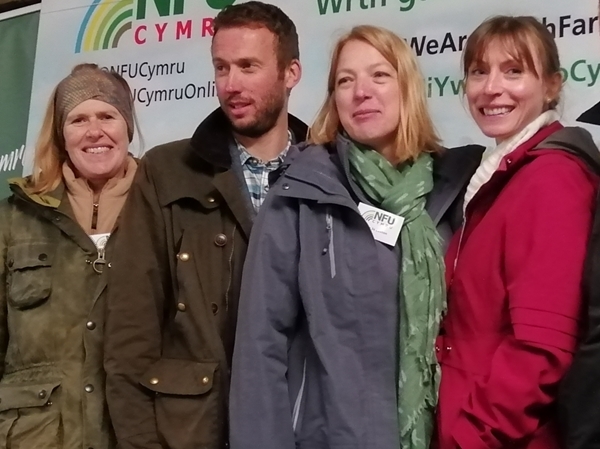
GWCT director Wales Sue Evans (far left) with fellow coference speakers
PROVIDING habitat, food and protection – known as the three-legged stool approach – could help our ground-nesting birds thrive in Wales, according to leading research organisation the Game & Wildlife Conservation Trust (GWCT).
Sue Evans, Wales director for the GWCT made the comments at the NFU Sustainable Agriculture: Food, Farming and the Environment conference, near Brecon, last week (June 7th).
“With the right levers and incentives farmers can restore numbers of our declining bird species,” she said.
“By creating the right habitat, along with legal predator control and feeding birds with well managed cover crops, we would help birds survive ‘the hungry gap’ during the winter months and give them a far better chance of breeding successfully.”
Ms Evans called for a different approach focusing on farmers to reverse the decline in our most-at-risk species rather than concentrating on nature reserves.
“Nature reserves have largely failed to deliver nature recovery to date in Wales and we must do something different, urgently and collectively by focusing on the farmers, who manage over 80% of the Welsh landscape - and given the right incentives and advice they can deliver far more for biodiversity. They are best placed and our only hope for a true sustainable environment alongside with sustainable food production.”
“We have the science, the evidence and would encourage everyone to adopt this approach if we are serious in recovering bird populations in Wales.”
But she warned, the three-legged principle means success is not possible with any one leg of the stool missing.
“All three legs - year-round habitat, feeding and protection - are as important as each other if we seriously want to help our birds, particularly ground-nesting birds to thrive in our Welsh countryside,” Sue continued.
“Protection of these birds needs to be back on the agenda and delivered on the ground which works best within farmer-led projects working with local communities.”
The principle has been at the heart of the GWCT approach to conservation for decades and has been used to help the local numbers of species such as lapwing, grey partridge and water voles to thrive where they were previously struggling.
Notes to editors
The Game & Wildlife Conservation Trust – providing research-led conservation for a thriving countryside. The GWCT is an independent wildlife conservation charity which has carried out scientific research into Britain’s game and wildlife since the 1930s. We advise farmers and landowners on improving wildlife habitats. We employ 22 post-doctoral scientists and 50 other research staff with expertise in areas such as birds, insects, mammals, farming, fish and statistics. We undertake our own research as well as projects funded by contract and grant-aid from Government and private bodies. The Trust is also responsible for a number of Government Biodiversity Action Plan species and is lead partner for grey partridge and joint lead partner for brown hare and black grouse.
For information, contact:
Eleanor Williams
Telephone: 07592 025476
Email: press@gwct.org.uk